Organisational Behaviour Analysis: Culture, Power at Intercontinental
VerifiedAdded on 2023/01/19
|15
|4877
|89
Report
AI Summary
This report provides an analysis of organisational behaviour within Intercontinental Hotels & Resorts, focusing on the influence of culture, power, and politics on both individual and team dynamics. It examines various motivational theories, including Equity Theory and Herzberg's Two-Factor Theory, to understand how employee behaviour can be influenced and directed towards achieving organisational goals. The report also delves into the characteristics of effective and ineffective teams, exploring how cooperation can be fostered through different team structures. Furthermore, it discusses the application of organisational behaviour philosophies, particularly Tuckman's team development model, in shaping organisational behaviour and improving overall performance. The document concludes by emphasizing the interconnectedness of organisational culture, power dynamics, political influences, and employee motivation in driving organisational success. Desklib provides access to this and other solved assignments.
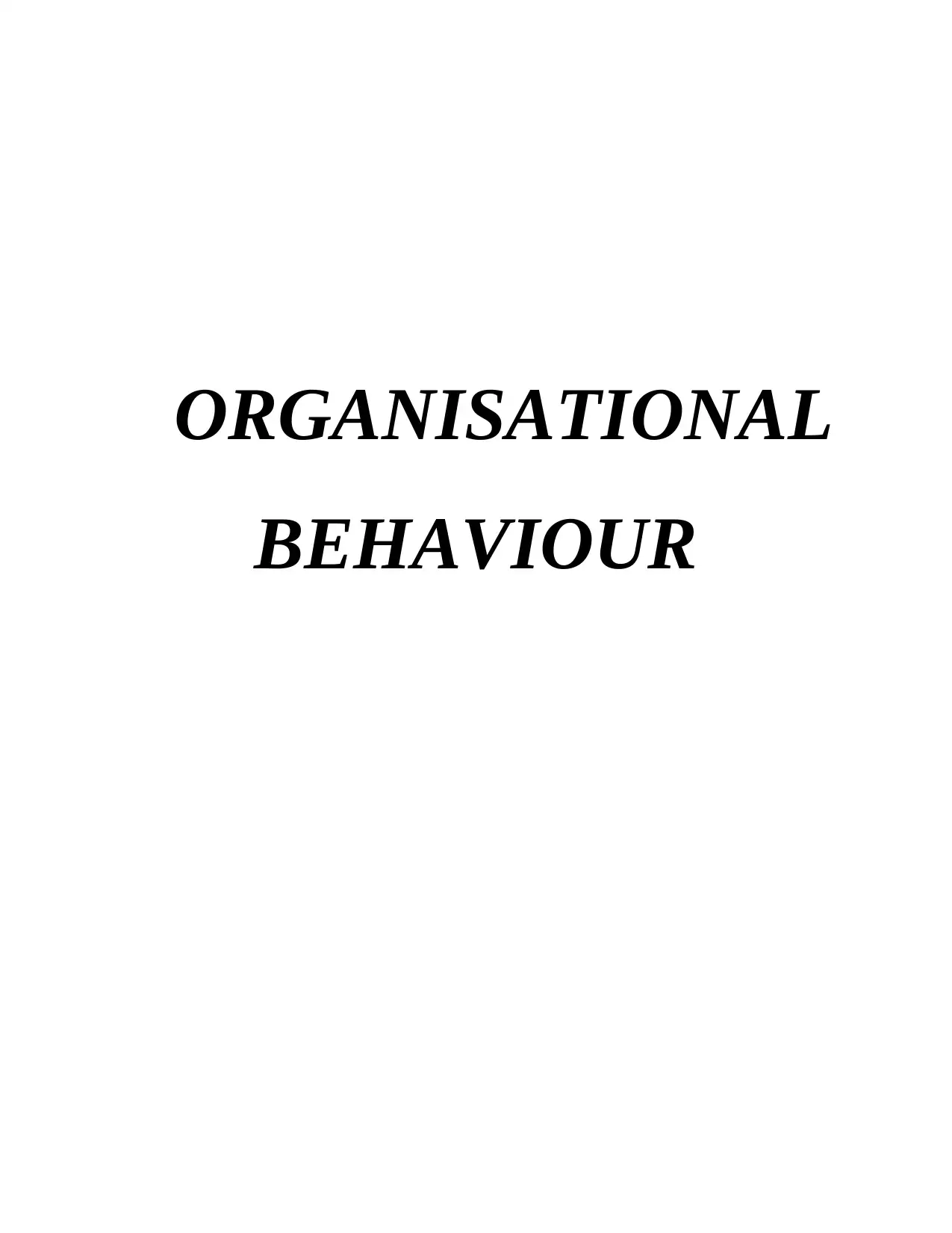
ORGANISATIONAL
BEHAVIOUR
BEHAVIOUR
Paraphrase This Document
Need a fresh take? Get an instant paraphrase of this document with our AI Paraphraser
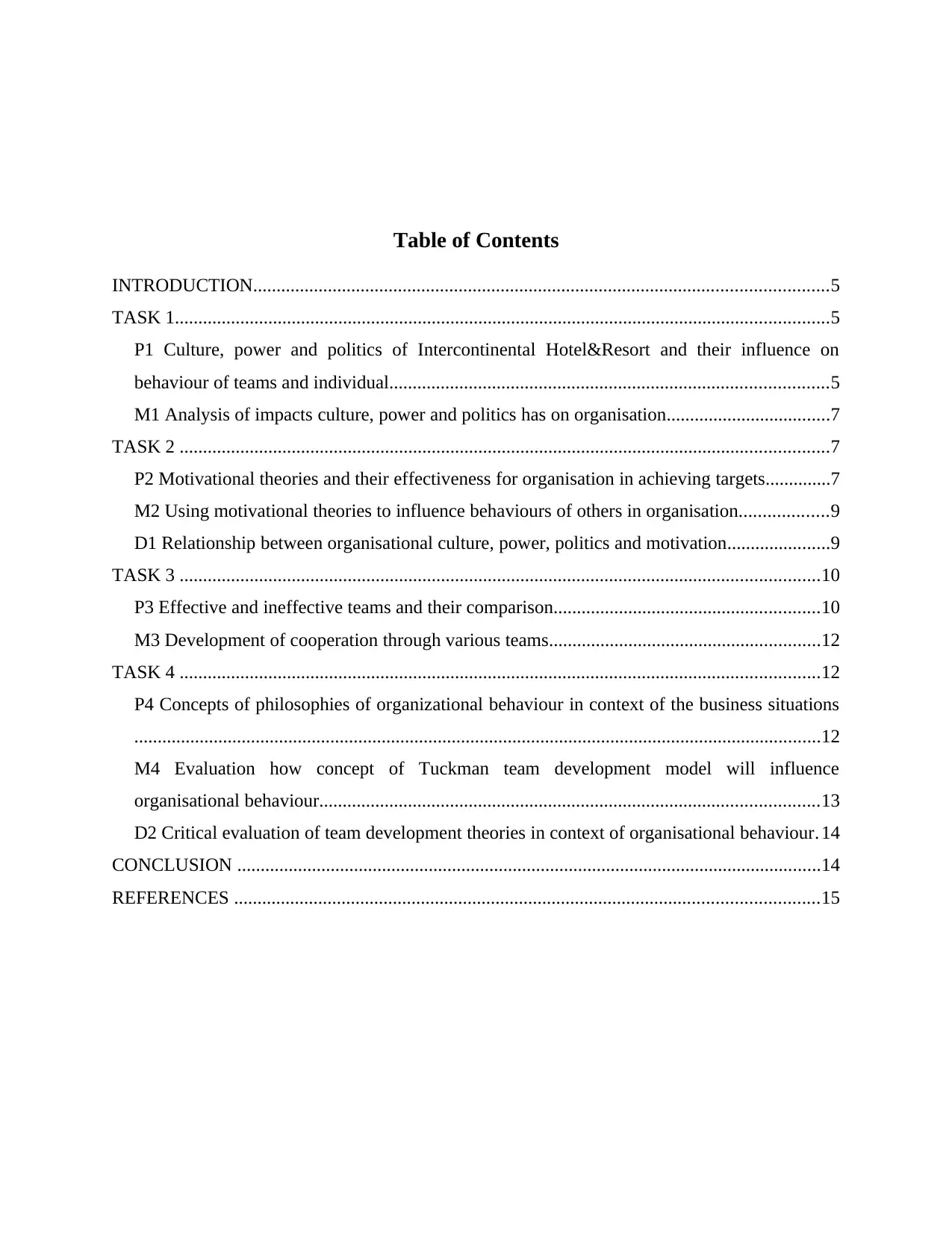
Table of Contents
INTRODUCTION...........................................................................................................................5
TASK 1............................................................................................................................................5
P1 Culture, power and politics of Intercontinental Hotel&Resort and their influence on
behaviour of teams and individual..............................................................................................5
M1 Analysis of impacts culture, power and politics has on organisation...................................7
TASK 2 ...........................................................................................................................................7
P2 Motivational theories and their effectiveness for organisation in achieving targets..............7
M2 Using motivational theories to influence behaviours of others in organisation...................9
D1 Relationship between organisational culture, power, politics and motivation......................9
TASK 3 .........................................................................................................................................10
P3 Effective and ineffective teams and their comparison.........................................................10
M3 Development of cooperation through various teams..........................................................12
TASK 4 .........................................................................................................................................12
P4 Concepts of philosophies of organizational behaviour in context of the business situations
...................................................................................................................................................12
M4 Evaluation how concept of Tuckman team development model will influence
organisational behaviour...........................................................................................................13
D2 Critical evaluation of team development theories in context of organisational behaviour. 14
CONCLUSION .............................................................................................................................14
REFERENCES .............................................................................................................................15
INTRODUCTION...........................................................................................................................5
TASK 1............................................................................................................................................5
P1 Culture, power and politics of Intercontinental Hotel&Resort and their influence on
behaviour of teams and individual..............................................................................................5
M1 Analysis of impacts culture, power and politics has on organisation...................................7
TASK 2 ...........................................................................................................................................7
P2 Motivational theories and their effectiveness for organisation in achieving targets..............7
M2 Using motivational theories to influence behaviours of others in organisation...................9
D1 Relationship between organisational culture, power, politics and motivation......................9
TASK 3 .........................................................................................................................................10
P3 Effective and ineffective teams and their comparison.........................................................10
M3 Development of cooperation through various teams..........................................................12
TASK 4 .........................................................................................................................................12
P4 Concepts of philosophies of organizational behaviour in context of the business situations
...................................................................................................................................................12
M4 Evaluation how concept of Tuckman team development model will influence
organisational behaviour...........................................................................................................13
D2 Critical evaluation of team development theories in context of organisational behaviour. 14
CONCLUSION .............................................................................................................................14
REFERENCES .............................................................................................................................15
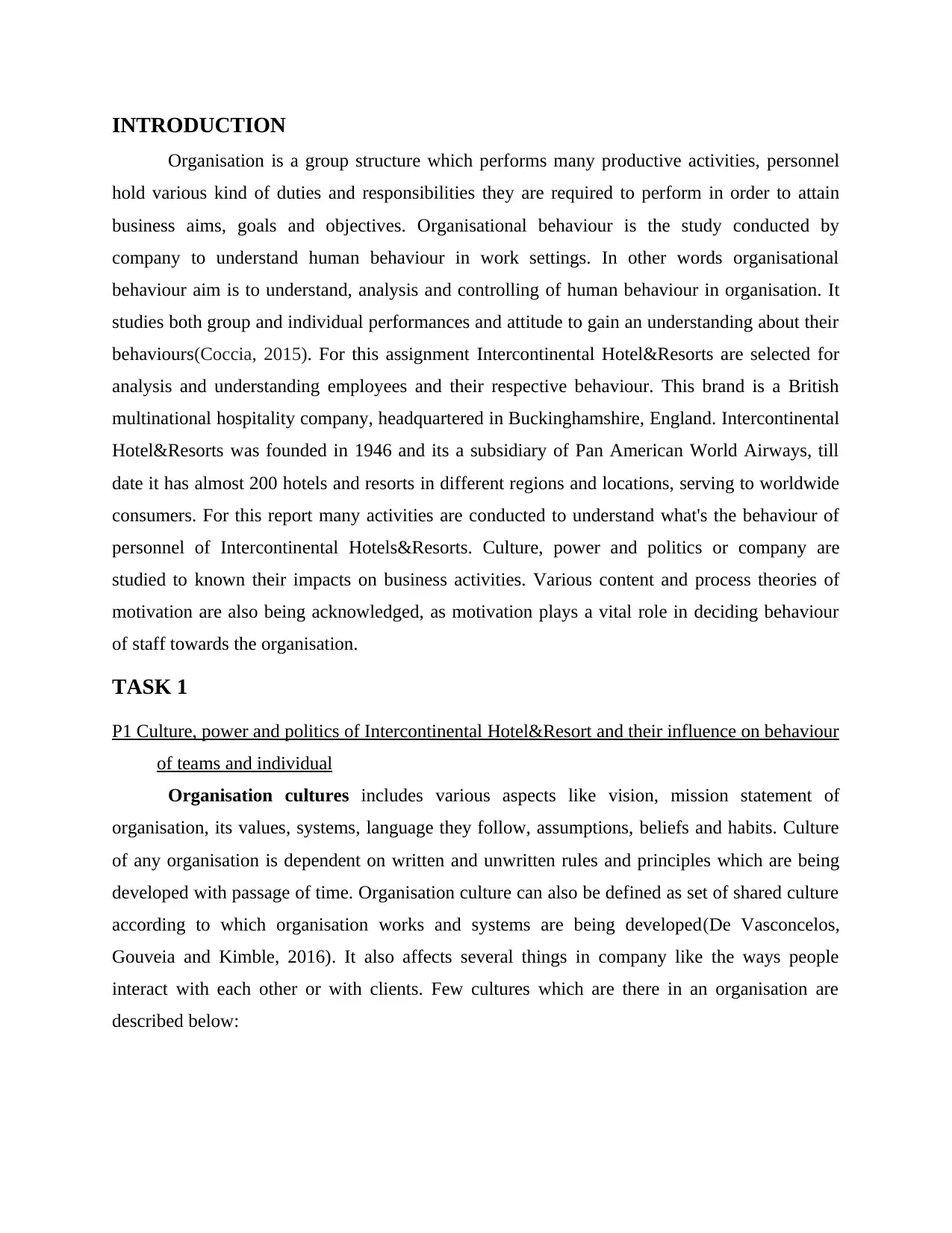
INTRODUCTION
Organisation is a group structure which performs many productive activities, personnel
hold various kind of duties and responsibilities they are required to perform in order to attain
business aims, goals and objectives. Organisational behaviour is the study conducted by
company to understand human behaviour in work settings. In other words organisational
behaviour aim is to understand, analysis and controlling of human behaviour in organisation. It
studies both group and individual performances and attitude to gain an understanding about their
behaviours(Coccia, 2015). For this assignment Intercontinental Hotel&Resorts are selected for
analysis and understanding employees and their respective behaviour. This brand is a British
multinational hospitality company, headquartered in Buckinghamshire, England. Intercontinental
Hotel&Resorts was founded in 1946 and its a subsidiary of Pan American World Airways, till
date it has almost 200 hotels and resorts in different regions and locations, serving to worldwide
consumers. For this report many activities are conducted to understand what's the behaviour of
personnel of Intercontinental Hotels&Resorts. Culture, power and politics or company are
studied to known their impacts on business activities. Various content and process theories of
motivation are also being acknowledged, as motivation plays a vital role in deciding behaviour
of staff towards the organisation.
TASK 1
P1 Culture, power and politics of Intercontinental Hotel&Resort and their influence on behaviour
of teams and individual
Organisation cultures includes various aspects like vision, mission statement of
organisation, its values, systems, language they follow, assumptions, beliefs and habits. Culture
of any organisation is dependent on written and unwritten rules and principles which are being
developed with passage of time. Organisation culture can also be defined as set of shared culture
according to which organisation works and systems are being developed(De Vasconcelos,
Gouveia and Kimble, 2016). It also affects several things in company like the ways people
interact with each other or with clients. Few cultures which are there in an organisation are
described below:
Organisation is a group structure which performs many productive activities, personnel
hold various kind of duties and responsibilities they are required to perform in order to attain
business aims, goals and objectives. Organisational behaviour is the study conducted by
company to understand human behaviour in work settings. In other words organisational
behaviour aim is to understand, analysis and controlling of human behaviour in organisation. It
studies both group and individual performances and attitude to gain an understanding about their
behaviours(Coccia, 2015). For this assignment Intercontinental Hotel&Resorts are selected for
analysis and understanding employees and their respective behaviour. This brand is a British
multinational hospitality company, headquartered in Buckinghamshire, England. Intercontinental
Hotel&Resorts was founded in 1946 and its a subsidiary of Pan American World Airways, till
date it has almost 200 hotels and resorts in different regions and locations, serving to worldwide
consumers. For this report many activities are conducted to understand what's the behaviour of
personnel of Intercontinental Hotels&Resorts. Culture, power and politics or company are
studied to known their impacts on business activities. Various content and process theories of
motivation are also being acknowledged, as motivation plays a vital role in deciding behaviour
of staff towards the organisation.
TASK 1
P1 Culture, power and politics of Intercontinental Hotel&Resort and their influence on behaviour
of teams and individual
Organisation cultures includes various aspects like vision, mission statement of
organisation, its values, systems, language they follow, assumptions, beliefs and habits. Culture
of any organisation is dependent on written and unwritten rules and principles which are being
developed with passage of time. Organisation culture can also be defined as set of shared culture
according to which organisation works and systems are being developed(De Vasconcelos,
Gouveia and Kimble, 2016). It also affects several things in company like the ways people
interact with each other or with clients. Few cultures which are there in an organisation are
described below:
⊘ This is a preview!⊘
Do you want full access?
Subscribe today to unlock all pages.

Trusted by 1+ million students worldwide
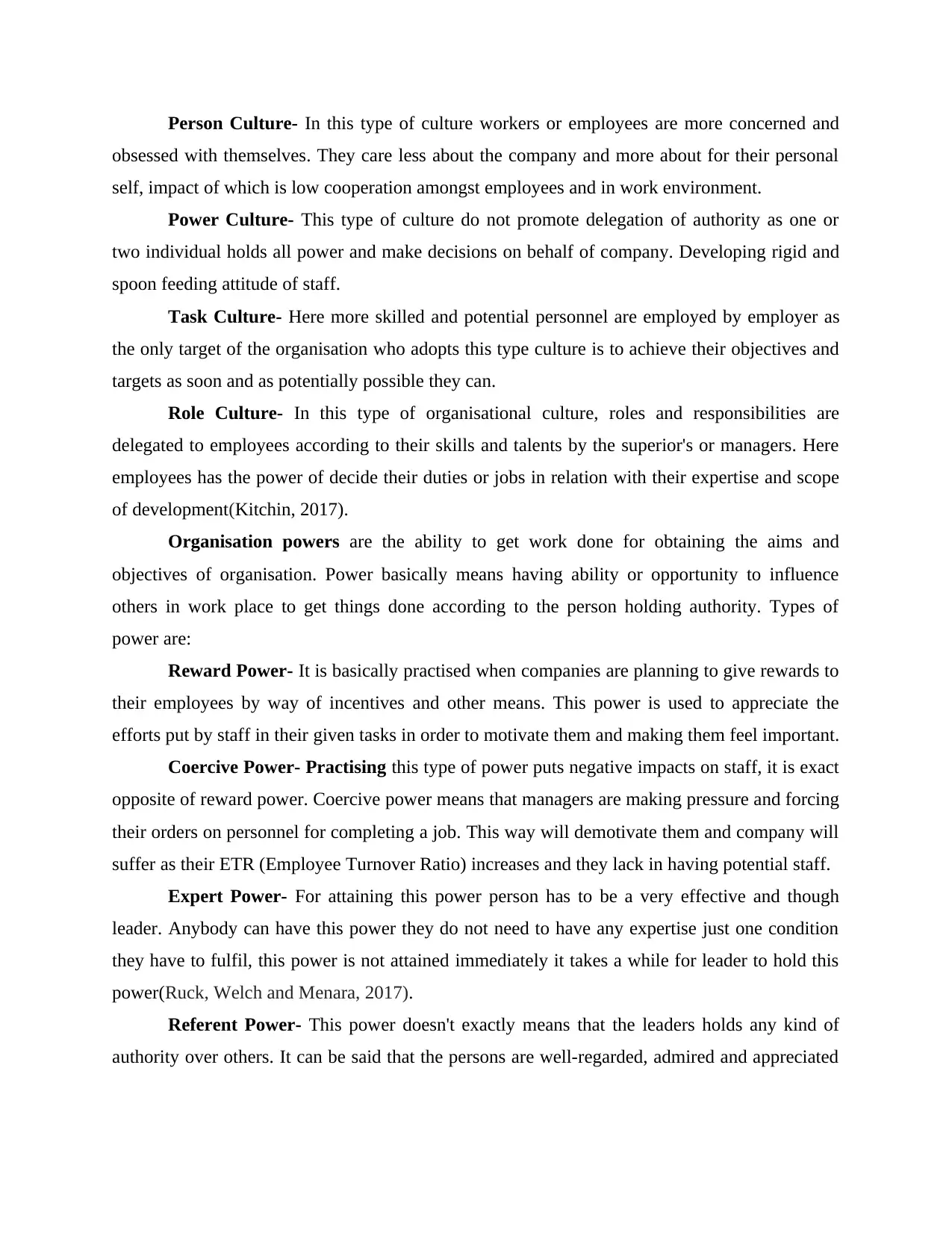
Person Culture- In this type of culture workers or employees are more concerned and
obsessed with themselves. They care less about the company and more about for their personal
self, impact of which is low cooperation amongst employees and in work environment.
Power Culture- This type of culture do not promote delegation of authority as one or
two individual holds all power and make decisions on behalf of company. Developing rigid and
spoon feeding attitude of staff.
Task Culture- Here more skilled and potential personnel are employed by employer as
the only target of the organisation who adopts this type culture is to achieve their objectives and
targets as soon and as potentially possible they can.
Role Culture- In this type of organisational culture, roles and responsibilities are
delegated to employees according to their skills and talents by the superior's or managers. Here
employees has the power of decide their duties or jobs in relation with their expertise and scope
of development(Kitchin, 2017).
Organisation powers are the ability to get work done for obtaining the aims and
objectives of organisation. Power basically means having ability or opportunity to influence
others in work place to get things done according to the person holding authority. Types of
power are:
Reward Power- It is basically practised when companies are planning to give rewards to
their employees by way of incentives and other means. This power is used to appreciate the
efforts put by staff in their given tasks in order to motivate them and making them feel important.
Coercive Power- Practising this type of power puts negative impacts on staff, it is exact
opposite of reward power. Coercive power means that managers are making pressure and forcing
their orders on personnel for completing a job. This way will demotivate them and company will
suffer as their ETR (Employee Turnover Ratio) increases and they lack in having potential staff.
Expert Power- For attaining this power person has to be a very effective and though
leader. Anybody can have this power they do not need to have any expertise just one condition
they have to fulfil, this power is not attained immediately it takes a while for leader to hold this
power(Ruck, Welch and Menara, 2017).
Referent Power- This power doesn't exactly means that the leaders holds any kind of
authority over others. It can be said that the persons are well-regarded, admired and appreciated
obsessed with themselves. They care less about the company and more about for their personal
self, impact of which is low cooperation amongst employees and in work environment.
Power Culture- This type of culture do not promote delegation of authority as one or
two individual holds all power and make decisions on behalf of company. Developing rigid and
spoon feeding attitude of staff.
Task Culture- Here more skilled and potential personnel are employed by employer as
the only target of the organisation who adopts this type culture is to achieve their objectives and
targets as soon and as potentially possible they can.
Role Culture- In this type of organisational culture, roles and responsibilities are
delegated to employees according to their skills and talents by the superior's or managers. Here
employees has the power of decide their duties or jobs in relation with their expertise and scope
of development(Kitchin, 2017).
Organisation powers are the ability to get work done for obtaining the aims and
objectives of organisation. Power basically means having ability or opportunity to influence
others in work place to get things done according to the person holding authority. Types of
power are:
Reward Power- It is basically practised when companies are planning to give rewards to
their employees by way of incentives and other means. This power is used to appreciate the
efforts put by staff in their given tasks in order to motivate them and making them feel important.
Coercive Power- Practising this type of power puts negative impacts on staff, it is exact
opposite of reward power. Coercive power means that managers are making pressure and forcing
their orders on personnel for completing a job. This way will demotivate them and company will
suffer as their ETR (Employee Turnover Ratio) increases and they lack in having potential staff.
Expert Power- For attaining this power person has to be a very effective and though
leader. Anybody can have this power they do not need to have any expertise just one condition
they have to fulfil, this power is not attained immediately it takes a while for leader to hold this
power(Ruck, Welch and Menara, 2017).
Referent Power- This power doesn't exactly means that the leaders holds any kind of
authority over others. It can be said that the persons are well-regarded, admired and appreciated
Paraphrase This Document
Need a fresh take? Get an instant paraphrase of this document with our AI Paraphraser
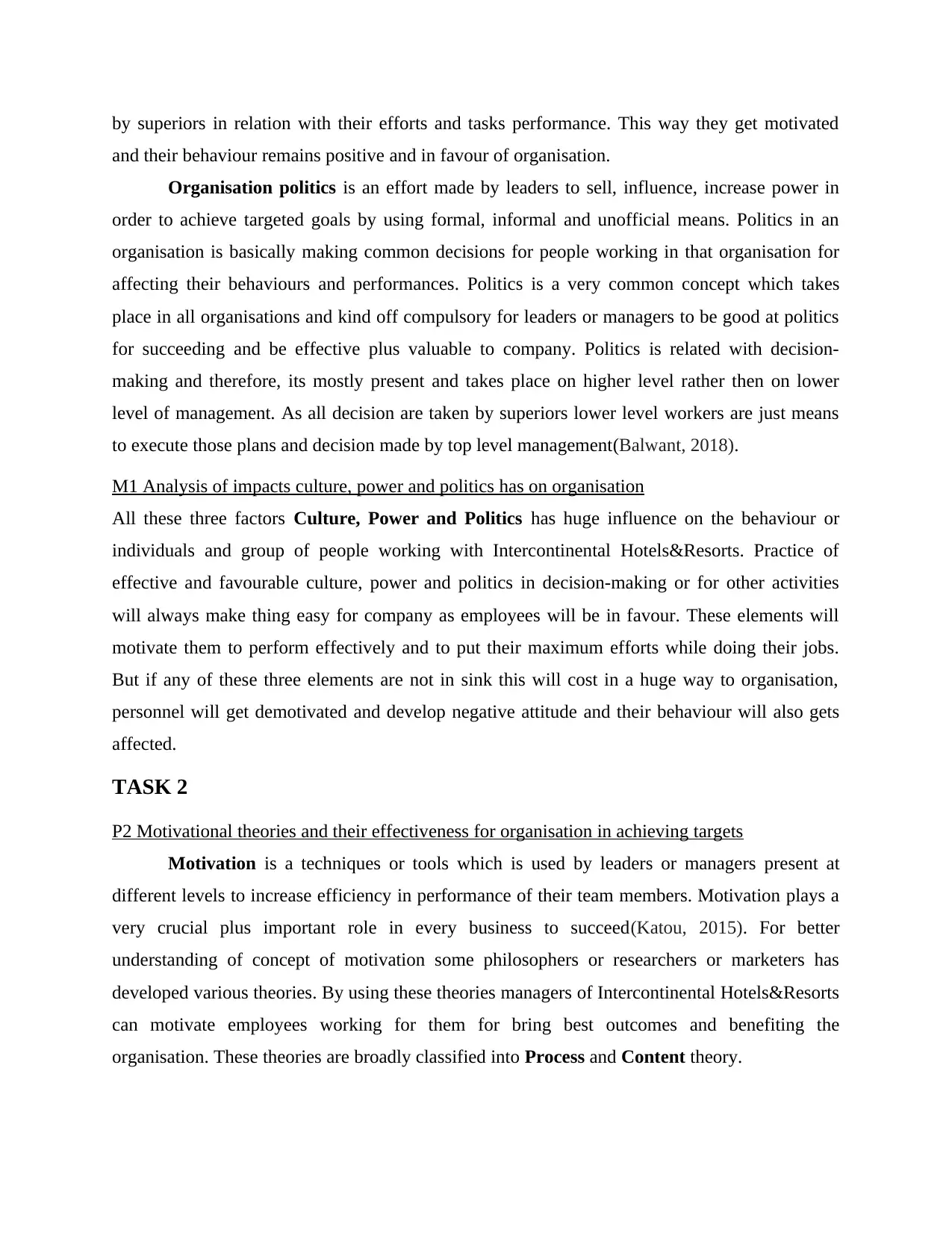
by superiors in relation with their efforts and tasks performance. This way they get motivated
and their behaviour remains positive and in favour of organisation.
Organisation politics is an effort made by leaders to sell, influence, increase power in
order to achieve targeted goals by using formal, informal and unofficial means. Politics in an
organisation is basically making common decisions for people working in that organisation for
affecting their behaviours and performances. Politics is a very common concept which takes
place in all organisations and kind off compulsory for leaders or managers to be good at politics
for succeeding and be effective plus valuable to company. Politics is related with decision-
making and therefore, its mostly present and takes place on higher level rather then on lower
level of management. As all decision are taken by superiors lower level workers are just means
to execute those plans and decision made by top level management(Balwant, 2018).
M1 Analysis of impacts culture, power and politics has on organisation
All these three factors Culture, Power and Politics has huge influence on the behaviour or
individuals and group of people working with Intercontinental Hotels&Resorts. Practice of
effective and favourable culture, power and politics in decision-making or for other activities
will always make thing easy for company as employees will be in favour. These elements will
motivate them to perform effectively and to put their maximum efforts while doing their jobs.
But if any of these three elements are not in sink this will cost in a huge way to organisation,
personnel will get demotivated and develop negative attitude and their behaviour will also gets
affected.
TASK 2
P2 Motivational theories and their effectiveness for organisation in achieving targets
Motivation is a techniques or tools which is used by leaders or managers present at
different levels to increase efficiency in performance of their team members. Motivation plays a
very crucial plus important role in every business to succeed(Katou, 2015). For better
understanding of concept of motivation some philosophers or researchers or marketers has
developed various theories. By using these theories managers of Intercontinental Hotels&Resorts
can motivate employees working for them for bring best outcomes and benefiting the
organisation. These theories are broadly classified into Process and Content theory.
and their behaviour remains positive and in favour of organisation.
Organisation politics is an effort made by leaders to sell, influence, increase power in
order to achieve targeted goals by using formal, informal and unofficial means. Politics in an
organisation is basically making common decisions for people working in that organisation for
affecting their behaviours and performances. Politics is a very common concept which takes
place in all organisations and kind off compulsory for leaders or managers to be good at politics
for succeeding and be effective plus valuable to company. Politics is related with decision-
making and therefore, its mostly present and takes place on higher level rather then on lower
level of management. As all decision are taken by superiors lower level workers are just means
to execute those plans and decision made by top level management(Balwant, 2018).
M1 Analysis of impacts culture, power and politics has on organisation
All these three factors Culture, Power and Politics has huge influence on the behaviour or
individuals and group of people working with Intercontinental Hotels&Resorts. Practice of
effective and favourable culture, power and politics in decision-making or for other activities
will always make thing easy for company as employees will be in favour. These elements will
motivate them to perform effectively and to put their maximum efforts while doing their jobs.
But if any of these three elements are not in sink this will cost in a huge way to organisation,
personnel will get demotivated and develop negative attitude and their behaviour will also gets
affected.
TASK 2
P2 Motivational theories and their effectiveness for organisation in achieving targets
Motivation is a techniques or tools which is used by leaders or managers present at
different levels to increase efficiency in performance of their team members. Motivation plays a
very crucial plus important role in every business to succeed(Katou, 2015). For better
understanding of concept of motivation some philosophers or researchers or marketers has
developed various theories. By using these theories managers of Intercontinental Hotels&Resorts
can motivate employees working for them for bring best outcomes and benefiting the
organisation. These theories are broadly classified into Process and Content theory.
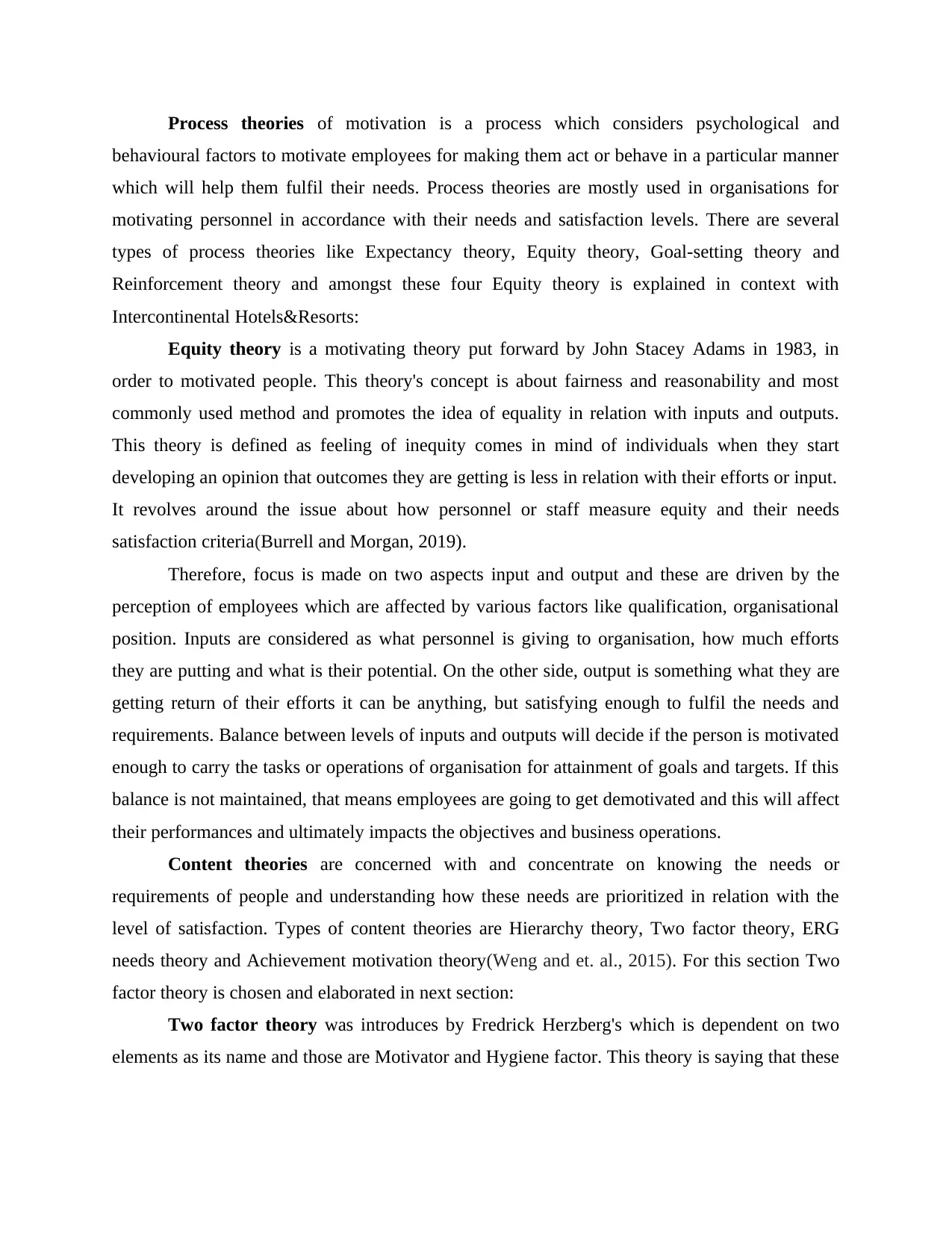
Process theories of motivation is a process which considers psychological and
behavioural factors to motivate employees for making them act or behave in a particular manner
which will help them fulfil their needs. Process theories are mostly used in organisations for
motivating personnel in accordance with their needs and satisfaction levels. There are several
types of process theories like Expectancy theory, Equity theory, Goal-setting theory and
Reinforcement theory and amongst these four Equity theory is explained in context with
Intercontinental Hotels&Resorts:
Equity theory is a motivating theory put forward by John Stacey Adams in 1983, in
order to motivated people. This theory's concept is about fairness and reasonability and most
commonly used method and promotes the idea of equality in relation with inputs and outputs.
This theory is defined as feeling of inequity comes in mind of individuals when they start
developing an opinion that outcomes they are getting is less in relation with their efforts or input.
It revolves around the issue about how personnel or staff measure equity and their needs
satisfaction criteria(Burrell and Morgan, 2019).
Therefore, focus is made on two aspects input and output and these are driven by the
perception of employees which are affected by various factors like qualification, organisational
position. Inputs are considered as what personnel is giving to organisation, how much efforts
they are putting and what is their potential. On the other side, output is something what they are
getting return of their efforts it can be anything, but satisfying enough to fulfil the needs and
requirements. Balance between levels of inputs and outputs will decide if the person is motivated
enough to carry the tasks or operations of organisation for attainment of goals and targets. If this
balance is not maintained, that means employees are going to get demotivated and this will affect
their performances and ultimately impacts the objectives and business operations.
Content theories are concerned with and concentrate on knowing the needs or
requirements of people and understanding how these needs are prioritized in relation with the
level of satisfaction. Types of content theories are Hierarchy theory, Two factor theory, ERG
needs theory and Achievement motivation theory(Weng and et. al., 2015). For this section Two
factor theory is chosen and elaborated in next section:
Two factor theory was introduces by Fredrick Herzberg's which is dependent on two
elements as its name and those are Motivator and Hygiene factor. This theory is saying that these
behavioural factors to motivate employees for making them act or behave in a particular manner
which will help them fulfil their needs. Process theories are mostly used in organisations for
motivating personnel in accordance with their needs and satisfaction levels. There are several
types of process theories like Expectancy theory, Equity theory, Goal-setting theory and
Reinforcement theory and amongst these four Equity theory is explained in context with
Intercontinental Hotels&Resorts:
Equity theory is a motivating theory put forward by John Stacey Adams in 1983, in
order to motivated people. This theory's concept is about fairness and reasonability and most
commonly used method and promotes the idea of equality in relation with inputs and outputs.
This theory is defined as feeling of inequity comes in mind of individuals when they start
developing an opinion that outcomes they are getting is less in relation with their efforts or input.
It revolves around the issue about how personnel or staff measure equity and their needs
satisfaction criteria(Burrell and Morgan, 2019).
Therefore, focus is made on two aspects input and output and these are driven by the
perception of employees which are affected by various factors like qualification, organisational
position. Inputs are considered as what personnel is giving to organisation, how much efforts
they are putting and what is their potential. On the other side, output is something what they are
getting return of their efforts it can be anything, but satisfying enough to fulfil the needs and
requirements. Balance between levels of inputs and outputs will decide if the person is motivated
enough to carry the tasks or operations of organisation for attainment of goals and targets. If this
balance is not maintained, that means employees are going to get demotivated and this will affect
their performances and ultimately impacts the objectives and business operations.
Content theories are concerned with and concentrate on knowing the needs or
requirements of people and understanding how these needs are prioritized in relation with the
level of satisfaction. Types of content theories are Hierarchy theory, Two factor theory, ERG
needs theory and Achievement motivation theory(Weng and et. al., 2015). For this section Two
factor theory is chosen and elaborated in next section:
Two factor theory was introduces by Fredrick Herzberg's which is dependent on two
elements as its name and those are Motivator and Hygiene factor. This theory is saying that these
⊘ This is a preview!⊘
Do you want full access?
Subscribe today to unlock all pages.

Trusted by 1+ million students worldwide
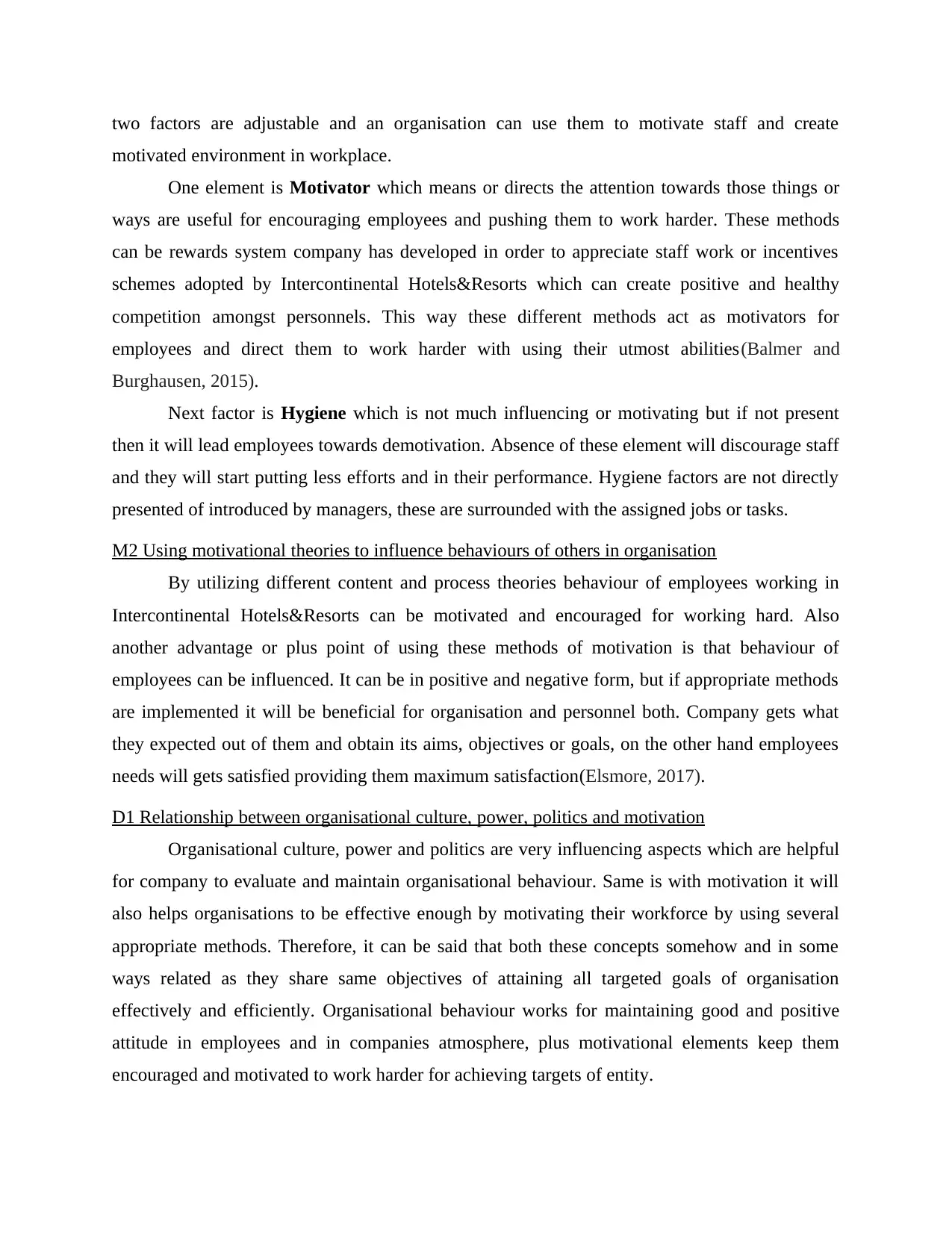
two factors are adjustable and an organisation can use them to motivate staff and create
motivated environment in workplace.
One element is Motivator which means or directs the attention towards those things or
ways are useful for encouraging employees and pushing them to work harder. These methods
can be rewards system company has developed in order to appreciate staff work or incentives
schemes adopted by Intercontinental Hotels&Resorts which can create positive and healthy
competition amongst personnels. This way these different methods act as motivators for
employees and direct them to work harder with using their utmost abilities(Balmer and
Burghausen, 2015).
Next factor is Hygiene which is not much influencing or motivating but if not present
then it will lead employees towards demotivation. Absence of these element will discourage staff
and they will start putting less efforts and in their performance. Hygiene factors are not directly
presented of introduced by managers, these are surrounded with the assigned jobs or tasks.
M2 Using motivational theories to influence behaviours of others in organisation
By utilizing different content and process theories behaviour of employees working in
Intercontinental Hotels&Resorts can be motivated and encouraged for working hard. Also
another advantage or plus point of using these methods of motivation is that behaviour of
employees can be influenced. It can be in positive and negative form, but if appropriate methods
are implemented it will be beneficial for organisation and personnel both. Company gets what
they expected out of them and obtain its aims, objectives or goals, on the other hand employees
needs will gets satisfied providing them maximum satisfaction(Elsmore, 2017).
D1 Relationship between organisational culture, power, politics and motivation
Organisational culture, power and politics are very influencing aspects which are helpful
for company to evaluate and maintain organisational behaviour. Same is with motivation it will
also helps organisations to be effective enough by motivating their workforce by using several
appropriate methods. Therefore, it can be said that both these concepts somehow and in some
ways related as they share same objectives of attaining all targeted goals of organisation
effectively and efficiently. Organisational behaviour works for maintaining good and positive
attitude in employees and in companies atmosphere, plus motivational elements keep them
encouraged and motivated to work harder for achieving targets of entity.
motivated environment in workplace.
One element is Motivator which means or directs the attention towards those things or
ways are useful for encouraging employees and pushing them to work harder. These methods
can be rewards system company has developed in order to appreciate staff work or incentives
schemes adopted by Intercontinental Hotels&Resorts which can create positive and healthy
competition amongst personnels. This way these different methods act as motivators for
employees and direct them to work harder with using their utmost abilities(Balmer and
Burghausen, 2015).
Next factor is Hygiene which is not much influencing or motivating but if not present
then it will lead employees towards demotivation. Absence of these element will discourage staff
and they will start putting less efforts and in their performance. Hygiene factors are not directly
presented of introduced by managers, these are surrounded with the assigned jobs or tasks.
M2 Using motivational theories to influence behaviours of others in organisation
By utilizing different content and process theories behaviour of employees working in
Intercontinental Hotels&Resorts can be motivated and encouraged for working hard. Also
another advantage or plus point of using these methods of motivation is that behaviour of
employees can be influenced. It can be in positive and negative form, but if appropriate methods
are implemented it will be beneficial for organisation and personnel both. Company gets what
they expected out of them and obtain its aims, objectives or goals, on the other hand employees
needs will gets satisfied providing them maximum satisfaction(Elsmore, 2017).
D1 Relationship between organisational culture, power, politics and motivation
Organisational culture, power and politics are very influencing aspects which are helpful
for company to evaluate and maintain organisational behaviour. Same is with motivation it will
also helps organisations to be effective enough by motivating their workforce by using several
appropriate methods. Therefore, it can be said that both these concepts somehow and in some
ways related as they share same objectives of attaining all targeted goals of organisation
effectively and efficiently. Organisational behaviour works for maintaining good and positive
attitude in employees and in companies atmosphere, plus motivational elements keep them
encouraged and motivated to work harder for achieving targets of entity.
Paraphrase This Document
Need a fresh take? Get an instant paraphrase of this document with our AI Paraphraser
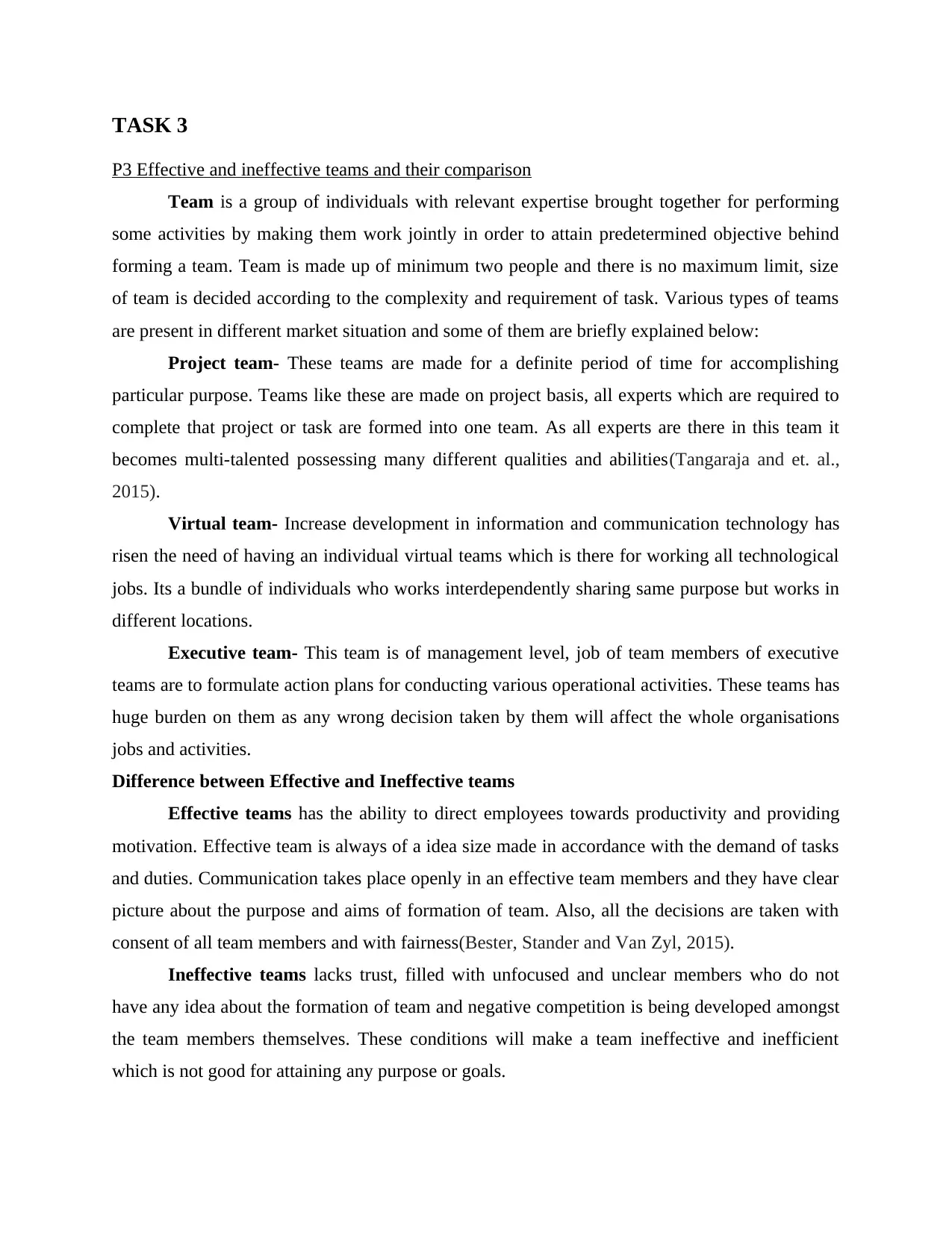
TASK 3
P3 Effective and ineffective teams and their comparison
Team is a group of individuals with relevant expertise brought together for performing
some activities by making them work jointly in order to attain predetermined objective behind
forming a team. Team is made up of minimum two people and there is no maximum limit, size
of team is decided according to the complexity and requirement of task. Various types of teams
are present in different market situation and some of them are briefly explained below:
Project team- These teams are made for a definite period of time for accomplishing
particular purpose. Teams like these are made on project basis, all experts which are required to
complete that project or task are formed into one team. As all experts are there in this team it
becomes multi-talented possessing many different qualities and abilities(Tangaraja and et. al.,
2015).
Virtual team- Increase development in information and communication technology has
risen the need of having an individual virtual teams which is there for working all technological
jobs. Its a bundle of individuals who works interdependently sharing same purpose but works in
different locations.
Executive team- This team is of management level, job of team members of executive
teams are to formulate action plans for conducting various operational activities. These teams has
huge burden on them as any wrong decision taken by them will affect the whole organisations
jobs and activities.
Difference between Effective and Ineffective teams
Effective teams has the ability to direct employees towards productivity and providing
motivation. Effective team is always of a idea size made in accordance with the demand of tasks
and duties. Communication takes place openly in an effective team members and they have clear
picture about the purpose and aims of formation of team. Also, all the decisions are taken with
consent of all team members and with fairness(Bester, Stander and Van Zyl, 2015).
Ineffective teams lacks trust, filled with unfocused and unclear members who do not
have any idea about the formation of team and negative competition is being developed amongst
the team members themselves. These conditions will make a team ineffective and inefficient
which is not good for attaining any purpose or goals.
P3 Effective and ineffective teams and their comparison
Team is a group of individuals with relevant expertise brought together for performing
some activities by making them work jointly in order to attain predetermined objective behind
forming a team. Team is made up of minimum two people and there is no maximum limit, size
of team is decided according to the complexity and requirement of task. Various types of teams
are present in different market situation and some of them are briefly explained below:
Project team- These teams are made for a definite period of time for accomplishing
particular purpose. Teams like these are made on project basis, all experts which are required to
complete that project or task are formed into one team. As all experts are there in this team it
becomes multi-talented possessing many different qualities and abilities(Tangaraja and et. al.,
2015).
Virtual team- Increase development in information and communication technology has
risen the need of having an individual virtual teams which is there for working all technological
jobs. Its a bundle of individuals who works interdependently sharing same purpose but works in
different locations.
Executive team- This team is of management level, job of team members of executive
teams are to formulate action plans for conducting various operational activities. These teams has
huge burden on them as any wrong decision taken by them will affect the whole organisations
jobs and activities.
Difference between Effective and Ineffective teams
Effective teams has the ability to direct employees towards productivity and providing
motivation. Effective team is always of a idea size made in accordance with the demand of tasks
and duties. Communication takes place openly in an effective team members and they have clear
picture about the purpose and aims of formation of team. Also, all the decisions are taken with
consent of all team members and with fairness(Bester, Stander and Van Zyl, 2015).
Ineffective teams lacks trust, filled with unfocused and unclear members who do not
have any idea about the formation of team and negative competition is being developed amongst
the team members themselves. These conditions will make a team ineffective and inefficient
which is not good for attaining any purpose or goals.
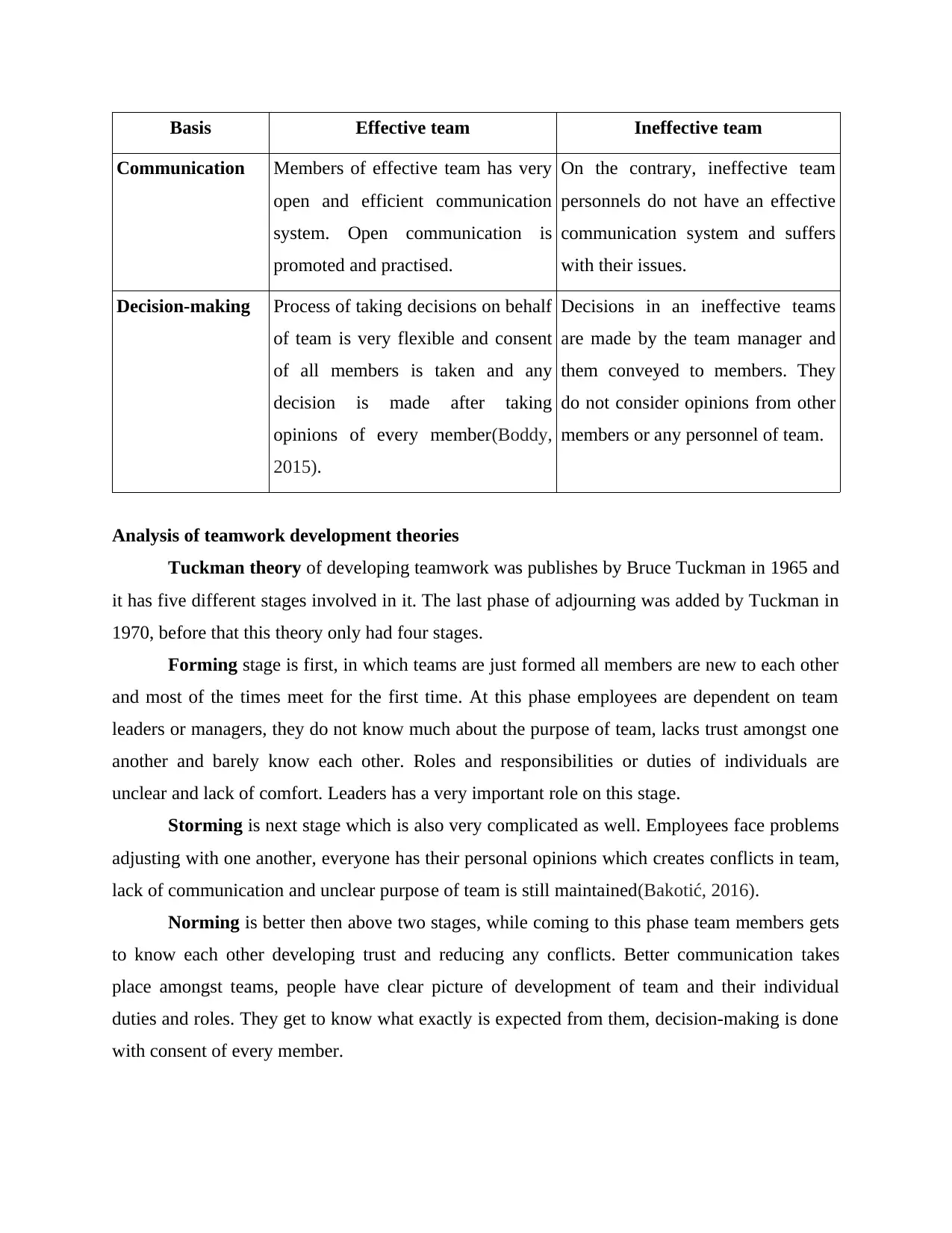
Basis Effective team Ineffective team
Communication Members of effective team has very
open and efficient communication
system. Open communication is
promoted and practised.
On the contrary, ineffective team
personnels do not have an effective
communication system and suffers
with their issues.
Decision-making Process of taking decisions on behalf
of team is very flexible and consent
of all members is taken and any
decision is made after taking
opinions of every member(Boddy,
2015).
Decisions in an ineffective teams
are made by the team manager and
them conveyed to members. They
do not consider opinions from other
members or any personnel of team.
Analysis of teamwork development theories
Tuckman theory of developing teamwork was publishes by Bruce Tuckman in 1965 and
it has five different stages involved in it. The last phase of adjourning was added by Tuckman in
1970, before that this theory only had four stages.
Forming stage is first, in which teams are just formed all members are new to each other
and most of the times meet for the first time. At this phase employees are dependent on team
leaders or managers, they do not know much about the purpose of team, lacks trust amongst one
another and barely know each other. Roles and responsibilities or duties of individuals are
unclear and lack of comfort. Leaders has a very important role on this stage.
Storming is next stage which is also very complicated as well. Employees face problems
adjusting with one another, everyone has their personal opinions which creates conflicts in team,
lack of communication and unclear purpose of team is still maintained(Bakotić, 2016).
Norming is better then above two stages, while coming to this phase team members gets
to know each other developing trust and reducing any conflicts. Better communication takes
place amongst teams, people have clear picture of development of team and their individual
duties and roles. They get to know what exactly is expected from them, decision-making is done
with consent of every member.
Communication Members of effective team has very
open and efficient communication
system. Open communication is
promoted and practised.
On the contrary, ineffective team
personnels do not have an effective
communication system and suffers
with their issues.
Decision-making Process of taking decisions on behalf
of team is very flexible and consent
of all members is taken and any
decision is made after taking
opinions of every member(Boddy,
2015).
Decisions in an ineffective teams
are made by the team manager and
them conveyed to members. They
do not consider opinions from other
members or any personnel of team.
Analysis of teamwork development theories
Tuckman theory of developing teamwork was publishes by Bruce Tuckman in 1965 and
it has five different stages involved in it. The last phase of adjourning was added by Tuckman in
1970, before that this theory only had four stages.
Forming stage is first, in which teams are just formed all members are new to each other
and most of the times meet for the first time. At this phase employees are dependent on team
leaders or managers, they do not know much about the purpose of team, lacks trust amongst one
another and barely know each other. Roles and responsibilities or duties of individuals are
unclear and lack of comfort. Leaders has a very important role on this stage.
Storming is next stage which is also very complicated as well. Employees face problems
adjusting with one another, everyone has their personal opinions which creates conflicts in team,
lack of communication and unclear purpose of team is still maintained(Bakotić, 2016).
Norming is better then above two stages, while coming to this phase team members gets
to know each other developing trust and reducing any conflicts. Better communication takes
place amongst teams, people have clear picture of development of team and their individual
duties and roles. They get to know what exactly is expected from them, decision-making is done
with consent of every member.
⊘ This is a preview!⊘
Do you want full access?
Subscribe today to unlock all pages.

Trusted by 1+ million students worldwide
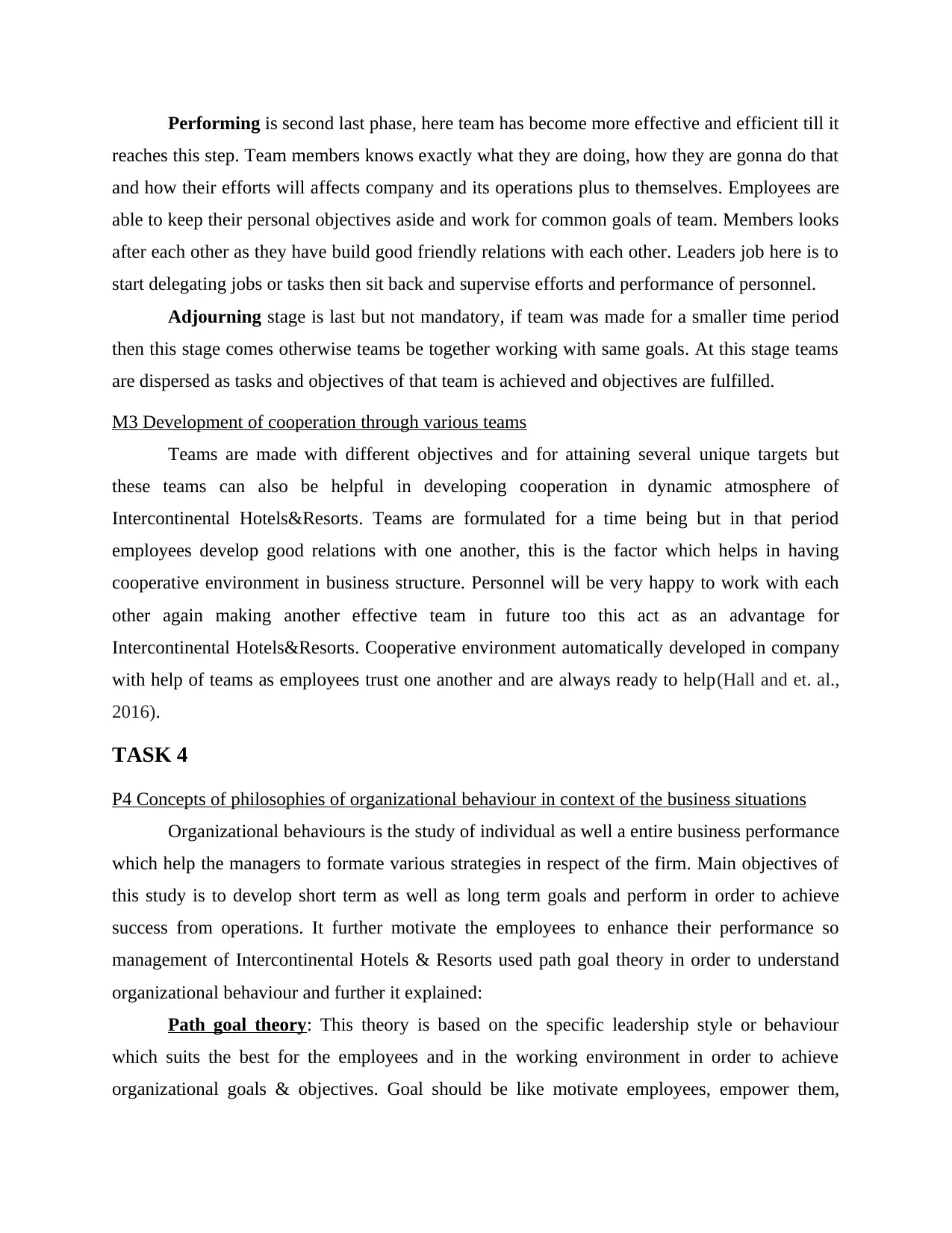
Performing is second last phase, here team has become more effective and efficient till it
reaches this step. Team members knows exactly what they are doing, how they are gonna do that
and how their efforts will affects company and its operations plus to themselves. Employees are
able to keep their personal objectives aside and work for common goals of team. Members looks
after each other as they have build good friendly relations with each other. Leaders job here is to
start delegating jobs or tasks then sit back and supervise efforts and performance of personnel.
Adjourning stage is last but not mandatory, if team was made for a smaller time period
then this stage comes otherwise teams be together working with same goals. At this stage teams
are dispersed as tasks and objectives of that team is achieved and objectives are fulfilled.
M3 Development of cooperation through various teams
Teams are made with different objectives and for attaining several unique targets but
these teams can also be helpful in developing cooperation in dynamic atmosphere of
Intercontinental Hotels&Resorts. Teams are formulated for a time being but in that period
employees develop good relations with one another, this is the factor which helps in having
cooperative environment in business structure. Personnel will be very happy to work with each
other again making another effective team in future too this act as an advantage for
Intercontinental Hotels&Resorts. Cooperative environment automatically developed in company
with help of teams as employees trust one another and are always ready to help(Hall and et. al.,
2016).
TASK 4
P4 Concepts of philosophies of organizational behaviour in context of the business situations
Organizational behaviours is the study of individual as well a entire business performance
which help the managers to formate various strategies in respect of the firm. Main objectives of
this study is to develop short term as well as long term goals and perform in order to achieve
success from operations. It further motivate the employees to enhance their performance so
management of Intercontinental Hotels & Resorts used path goal theory in order to understand
organizational behaviour and further it explained:
Path goal theory: This theory is based on the specific leadership style or behaviour
which suits the best for the employees and in the working environment in order to achieve
organizational goals & objectives. Goal should be like motivate employees, empower them,
reaches this step. Team members knows exactly what they are doing, how they are gonna do that
and how their efforts will affects company and its operations plus to themselves. Employees are
able to keep their personal objectives aside and work for common goals of team. Members looks
after each other as they have build good friendly relations with each other. Leaders job here is to
start delegating jobs or tasks then sit back and supervise efforts and performance of personnel.
Adjourning stage is last but not mandatory, if team was made for a smaller time period
then this stage comes otherwise teams be together working with same goals. At this stage teams
are dispersed as tasks and objectives of that team is achieved and objectives are fulfilled.
M3 Development of cooperation through various teams
Teams are made with different objectives and for attaining several unique targets but
these teams can also be helpful in developing cooperation in dynamic atmosphere of
Intercontinental Hotels&Resorts. Teams are formulated for a time being but in that period
employees develop good relations with one another, this is the factor which helps in having
cooperative environment in business structure. Personnel will be very happy to work with each
other again making another effective team in future too this act as an advantage for
Intercontinental Hotels&Resorts. Cooperative environment automatically developed in company
with help of teams as employees trust one another and are always ready to help(Hall and et. al.,
2016).
TASK 4
P4 Concepts of philosophies of organizational behaviour in context of the business situations
Organizational behaviours is the study of individual as well a entire business performance
which help the managers to formate various strategies in respect of the firm. Main objectives of
this study is to develop short term as well as long term goals and perform in order to achieve
success from operations. It further motivate the employees to enhance their performance so
management of Intercontinental Hotels & Resorts used path goal theory in order to understand
organizational behaviour and further it explained:
Path goal theory: This theory is based on the specific leadership style or behaviour
which suits the best for the employees and in the working environment in order to achieve
organizational goals & objectives. Goal should be like motivate employees, empower them,
Paraphrase This Document
Need a fresh take? Get an instant paraphrase of this document with our AI Paraphraser
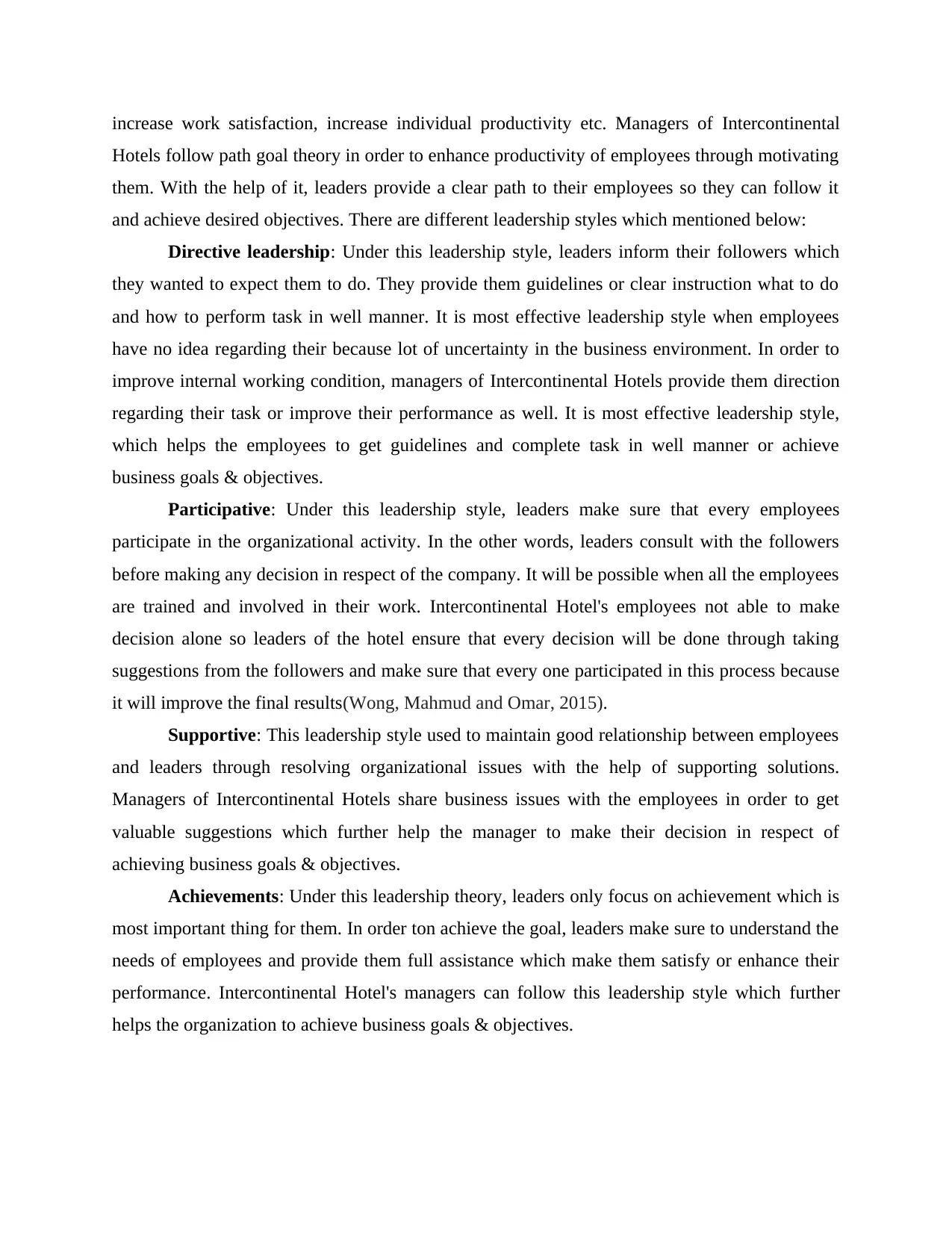
increase work satisfaction, increase individual productivity etc. Managers of Intercontinental
Hotels follow path goal theory in order to enhance productivity of employees through motivating
them. With the help of it, leaders provide a clear path to their employees so they can follow it
and achieve desired objectives. There are different leadership styles which mentioned below:
Directive leadership: Under this leadership style, leaders inform their followers which
they wanted to expect them to do. They provide them guidelines or clear instruction what to do
and how to perform task in well manner. It is most effective leadership style when employees
have no idea regarding their because lot of uncertainty in the business environment. In order to
improve internal working condition, managers of Intercontinental Hotels provide them direction
regarding their task or improve their performance as well. It is most effective leadership style,
which helps the employees to get guidelines and complete task in well manner or achieve
business goals & objectives.
Participative: Under this leadership style, leaders make sure that every employees
participate in the organizational activity. In the other words, leaders consult with the followers
before making any decision in respect of the company. It will be possible when all the employees
are trained and involved in their work. Intercontinental Hotel's employees not able to make
decision alone so leaders of the hotel ensure that every decision will be done through taking
suggestions from the followers and make sure that every one participated in this process because
it will improve the final results(Wong, Mahmud and Omar, 2015).
Supportive: This leadership style used to maintain good relationship between employees
and leaders through resolving organizational issues with the help of supporting solutions.
Managers of Intercontinental Hotels share business issues with the employees in order to get
valuable suggestions which further help the manager to make their decision in respect of
achieving business goals & objectives.
Achievements: Under this leadership theory, leaders only focus on achievement which is
most important thing for them. In order ton achieve the goal, leaders make sure to understand the
needs of employees and provide them full assistance which make them satisfy or enhance their
performance. Intercontinental Hotel's managers can follow this leadership style which further
helps the organization to achieve business goals & objectives.
Hotels follow path goal theory in order to enhance productivity of employees through motivating
them. With the help of it, leaders provide a clear path to their employees so they can follow it
and achieve desired objectives. There are different leadership styles which mentioned below:
Directive leadership: Under this leadership style, leaders inform their followers which
they wanted to expect them to do. They provide them guidelines or clear instruction what to do
and how to perform task in well manner. It is most effective leadership style when employees
have no idea regarding their because lot of uncertainty in the business environment. In order to
improve internal working condition, managers of Intercontinental Hotels provide them direction
regarding their task or improve their performance as well. It is most effective leadership style,
which helps the employees to get guidelines and complete task in well manner or achieve
business goals & objectives.
Participative: Under this leadership style, leaders make sure that every employees
participate in the organizational activity. In the other words, leaders consult with the followers
before making any decision in respect of the company. It will be possible when all the employees
are trained and involved in their work. Intercontinental Hotel's employees not able to make
decision alone so leaders of the hotel ensure that every decision will be done through taking
suggestions from the followers and make sure that every one participated in this process because
it will improve the final results(Wong, Mahmud and Omar, 2015).
Supportive: This leadership style used to maintain good relationship between employees
and leaders through resolving organizational issues with the help of supporting solutions.
Managers of Intercontinental Hotels share business issues with the employees in order to get
valuable suggestions which further help the manager to make their decision in respect of
achieving business goals & objectives.
Achievements: Under this leadership theory, leaders only focus on achievement which is
most important thing for them. In order ton achieve the goal, leaders make sure to understand the
needs of employees and provide them full assistance which make them satisfy or enhance their
performance. Intercontinental Hotel's managers can follow this leadership style which further
helps the organization to achieve business goals & objectives.
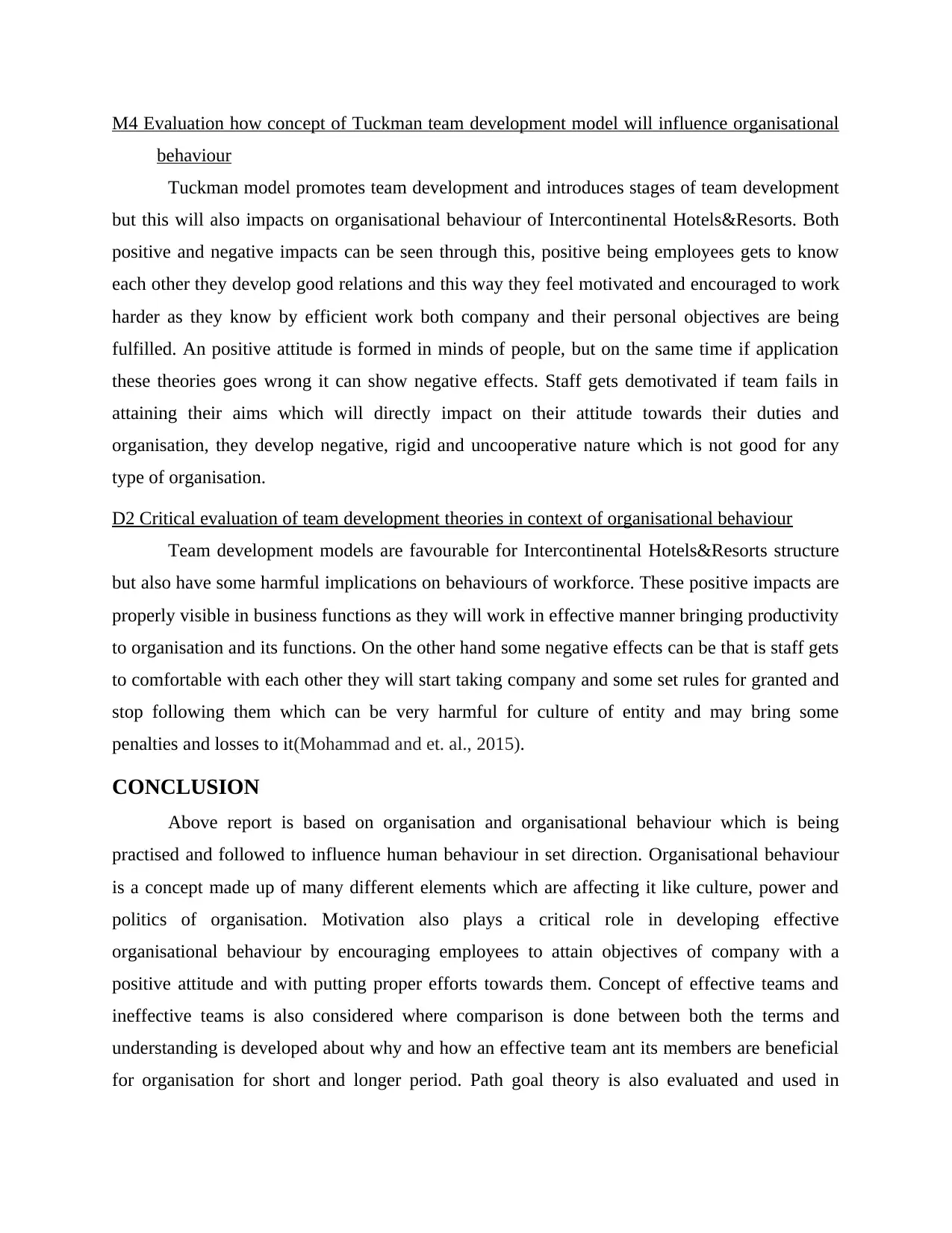
M4 Evaluation how concept of Tuckman team development model will influence organisational
behaviour
Tuckman model promotes team development and introduces stages of team development
but this will also impacts on organisational behaviour of Intercontinental Hotels&Resorts. Both
positive and negative impacts can be seen through this, positive being employees gets to know
each other they develop good relations and this way they feel motivated and encouraged to work
harder as they know by efficient work both company and their personal objectives are being
fulfilled. An positive attitude is formed in minds of people, but on the same time if application
these theories goes wrong it can show negative effects. Staff gets demotivated if team fails in
attaining their aims which will directly impact on their attitude towards their duties and
organisation, they develop negative, rigid and uncooperative nature which is not good for any
type of organisation.
D2 Critical evaluation of team development theories in context of organisational behaviour
Team development models are favourable for Intercontinental Hotels&Resorts structure
but also have some harmful implications on behaviours of workforce. These positive impacts are
properly visible in business functions as they will work in effective manner bringing productivity
to organisation and its functions. On the other hand some negative effects can be that is staff gets
to comfortable with each other they will start taking company and some set rules for granted and
stop following them which can be very harmful for culture of entity and may bring some
penalties and losses to it(Mohammad and et. al., 2015).
CONCLUSION
Above report is based on organisation and organisational behaviour which is being
practised and followed to influence human behaviour in set direction. Organisational behaviour
is a concept made up of many different elements which are affecting it like culture, power and
politics of organisation. Motivation also plays a critical role in developing effective
organisational behaviour by encouraging employees to attain objectives of company with a
positive attitude and with putting proper efforts towards them. Concept of effective teams and
ineffective teams is also considered where comparison is done between both the terms and
understanding is developed about why and how an effective team ant its members are beneficial
for organisation for short and longer period. Path goal theory is also evaluated and used in
behaviour
Tuckman model promotes team development and introduces stages of team development
but this will also impacts on organisational behaviour of Intercontinental Hotels&Resorts. Both
positive and negative impacts can be seen through this, positive being employees gets to know
each other they develop good relations and this way they feel motivated and encouraged to work
harder as they know by efficient work both company and their personal objectives are being
fulfilled. An positive attitude is formed in minds of people, but on the same time if application
these theories goes wrong it can show negative effects. Staff gets demotivated if team fails in
attaining their aims which will directly impact on their attitude towards their duties and
organisation, they develop negative, rigid and uncooperative nature which is not good for any
type of organisation.
D2 Critical evaluation of team development theories in context of organisational behaviour
Team development models are favourable for Intercontinental Hotels&Resorts structure
but also have some harmful implications on behaviours of workforce. These positive impacts are
properly visible in business functions as they will work in effective manner bringing productivity
to organisation and its functions. On the other hand some negative effects can be that is staff gets
to comfortable with each other they will start taking company and some set rules for granted and
stop following them which can be very harmful for culture of entity and may bring some
penalties and losses to it(Mohammad and et. al., 2015).
CONCLUSION
Above report is based on organisation and organisational behaviour which is being
practised and followed to influence human behaviour in set direction. Organisational behaviour
is a concept made up of many different elements which are affecting it like culture, power and
politics of organisation. Motivation also plays a critical role in developing effective
organisational behaviour by encouraging employees to attain objectives of company with a
positive attitude and with putting proper efforts towards them. Concept of effective teams and
ineffective teams is also considered where comparison is done between both the terms and
understanding is developed about why and how an effective team ant its members are beneficial
for organisation for short and longer period. Path goal theory is also evaluated and used in
⊘ This is a preview!⊘
Do you want full access?
Subscribe today to unlock all pages.

Trusted by 1+ million students worldwide
1 out of 15
Related Documents
Your All-in-One AI-Powered Toolkit for Academic Success.
+13062052269
info@desklib.com
Available 24*7 on WhatsApp / Email
![[object Object]](/_next/static/media/star-bottom.7253800d.svg)
Unlock your academic potential
Copyright © 2020–2026 A2Z Services. All Rights Reserved. Developed and managed by ZUCOL.





